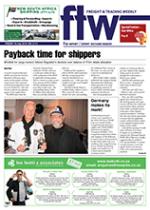Are the general rates
increases (GRIs)
implemented by shipping
lines a collusive practice?
According to certain of
the world’s shipper bodies,
GRIs – which seem to come
in at much the same time
and at similar
levels – could
be regarded
as collusion by
the carriers.
And
the legal
definition of
collusion is
pretty well
all-embracing,
according to
Nick Altini,
a director
with DLA
Cliffe Dekker
Hofmeyr,
who said that a hard and fast
rule was to never talk about
prices, cost information,
marketing strategies,
budgets and/or business
plans, agreements or even
terms and conditions with
competitors.
“And that includes
socially,” he added. “It is
very easy to cross the line.
And just being present at
the time of a discussion can
be considered collusion at
times.”
Grindrod’s
Andrew
Thomas,
who was
formerly MD
of the group’s
Ocean Africa
Container
Line (OACL),
agreed.
Shipping
executives
are keenly
conscious
of never
discussing
prices or rates
or anything even vaguely
related to them with people
outside their line, he told
FTW.
“For example, when I was
appointed to OACL I signed
a personal indemnity that I
wouldn’t discuss anything
about prices with competitive
line executives.” The penalty
for doing so, he added, was
immediate dismissal.
The lines themselves
are highly sensitive about
the matter because of the
enormous fines and penalties
that would be levied on them
if found guilty of such an
indiscretion. “It’s just not
worth it for them,” Thomas
said.
Tony Norton, a senior
partner with ENS, and the
legal adviser to the lines in
SA for a number of decades,
expressed similar sentiments.
“The lines are ultrasensitive
about the possibility
of collusion,” he said. “There
would be absolutely no
agreement between the lines
on such an issue as GRIs.”
He described it as “in the
nature of the market” if one
line decided the market could
bear a rates increase, and
other lines followed.
“That’s common sense,”
he added. “Similarly, it only
takes one line to make a
significant reduction of their
rates and other lines will
follow.”
Norton also highlighted an
example of the lines’ ultrasensitivity.
“At one time,”
he told FTW, “we could
have all the lines in
our rooms to discuss
some matter or other.
But not now.”
FTW also
quizzed two neutral
maritime lawyers on
the subject of GRIs.
Andrew Pike,
maritime law
specialist
and
partner at legal firm Velden
Pike Nichols (VPN), said
GRIs were always potentially
collusive. “But the lines
of course argue that they
are linked to freight rates
and bunker price
increases.”
And as
the freight
rates affect
everyone
equally
and
bunker
prices
likewise
all affect
everyone
at the
same
time, it is not unreasonable
for lines to increase rates
by about the same amounts
at about the same time, he
added.
“However, if there is any
suggestion that they are
benchmarking off each
other, or discussing with
each other the amount
of the increase, then that
is potentially collusive
and opens them up to a
Competition Commission
enquiry.”
And such a matter has
already happened.
In 2003 the Competition
Commission considered
whether it had jurisdiction
to consider exemptions
from collusive practices
in shipping, set out in
paragraph 19.1.2 of the
judgment. “It concluded that
it did have jurisdiction,” Pike
said.
He also noted that,
following this finding,
CompComm instituted an
enquiry into several shipping
lines which imposed
congestion surcharges
at about the same time
following the Transnet strike
in 2010.
“They were trying to show
that the lines involved had
agreed firstly to impose a
surcharge and secondly
within a particular range
what the amount of the
surcharge should be,”
said Pike.
“The CompCom
eventually did not
refer it to the Tribunal
and therefore must have
concluded that there was no
collusive behaviour and that
a congestion surcharge was
an international practice.
But it does illustrate the
issue.”
Said Andrew Robinson,
maritime legal specialist
and director
of legal firm
Norton Rose
Fulbright
(NRF) in
SA: “At some
stage I suspect
that the
Competition
Commission is
going to start
investigating
the freight
industry
generally
on anticompetitive
behaviour. I
rather think that there will
be wailing and gnashing of
teeth when the time comes!”
Internationally there
has been an increase in
investigations in relation
to collusive behaviour,
including in the freight
industry.
“NRF completion
teams have been involved
in a number of these
investigations in Europe,
North America and
elsewhere. So we have had
some experience of these
things,” said Robinson.
“Remember,” he said,
“that the powers of the
Competition Commission
are wide ranging (ask any of
the big corporates who have
recently fallen under the
Tribunal’s microscope about
that!)
“With regard to GRIs,
while similar
increases
in price
at similar
times can
be evidence
of collusion,
proof of
collusion
requires
there to be
at least a
concerted
practice
between
the parties.
This does
not mean
that there must be an overt
agreement but there must be
evidence of some cooperation
or co-ordination between the
parties that replaces their
independent conduct.”
INSERT & CAPTION 1
It is very easy to
cross the line. And
just being present
at the time of a
discussion can be
considered collusion
at times.
– Nick Altini
INSERT & CAPTION 2
Internationally there
has been an increase
in investigations in
relation to collusive
behaviour, including
in the freight
industry.
– Andrew Robinson

